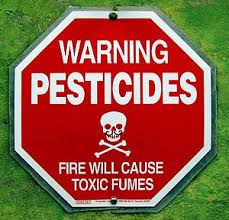 Update to the toxic pesticide acephate story of last week. Well, well, well.... Due to the big outcry after ProPublica's story exposing EPA's recent decision to relax standards and so allow much more of the toxic pesticide acephate in our food, the officials at the EPA changed their minds and now propose banning it!
Update to the toxic pesticide acephate story of last week. Well, well, well.... Due to the big outcry after ProPublica's story exposing EPA's recent decision to relax standards and so allow much more of the toxic pesticide acephate in our food, the officials at the EPA changed their minds and now propose banning it!
Acephate is an insect killer commonly used on celery, lettuce, cauliflower, tomatoes, peppers, and other fruits and vegetables, and residues stay on produce that we eat. It also contaminates drinking water. (It's used on non-organic crops, but it's not allowed to be used on organic crops.)
Propublica's story broke on April 24, 2024, and immediately afterwards there was outrage over the EPA's relaxing of the pesticide standards decision. This is because the FDA was totally ignoring years of scientific and medical research showing harms to humans, and only accepting and believing what the pesticide industry told them. It even ignored its own scientists and advisory groups.
Acephate is a pesticide known to be so harmful that it was BANNED in Europe more than 20 years ago, yet allowed in the US. A major reason: harmful effects on the developing brains of fetuses and children, and linked to autism, hyperactivity, and reduced scores on intelligence tests. In 2023, the CDC said that autism spectrum disorder rates have now increased to 1 out of every 36 births.
Now we wait and see: Will the FDA (once again) cave to industry or actually do what they are supposed to do - protect consumers?
ProPublica is a non-profit investigative journalism site. The following are excerpts from their May 1, 2024 story on the FDA reversal. From ProPublica: EPA Proposes Ban on Pesticide Widely Used on Fruits and Vegetables
The Environmental Protection Agency unveiled a proposal this week to ban a controversial pesticide that is widely used on celery, tomatoes and other fruits and vegetables.
The EPA released its plan on Tuesday, nearly a week after a ProPublica investigation revealed the agency had laid out a justification for increasing the amount of acephate allowed on food by removing limits meant to protect children’s developing brains.
In calling for an end to all uses of the pesticide on food, the agency cited evidence that acephate harms workers who apply the chemical as well as the general public and young children, who may be exposed to the pesticide through contaminated drinking water.
Acephate, which was banned by the European Union more than 20 years ago, belongs to a class of chemicals called organophosphates. U.S. farmers have used these pesticides for decades because they efficiently kill aphids, fire ants and other pests. But what makes organophosphate pesticides good bug killers — their ability to interfere with signals sent between nerve cells — also makes them dangerous to people. Studies have linked acephate to reductions in IQ and verbal comprehension and autism with intellectual disability.
Environmental advocates, who have been pushing the agency to restrict and ban acephate for years, said they were not expecting the agency to make such a bold move.
As much as 12 million pounds of acephate were used on soybeans, Brussels sprouts and other crops in 2019, according to the most recent estimates from the U.S. Geological Survey. The federal agency estimates that up to 30% of celery, 35% of lettuce and 20% of cauliflower and peppers were grown with acephate.
A draft risk assessment issued in August by the EPA’s Office of Pesticide Programs found “little to no evidence” that acephate and a chemical created when it breaks down in the body harm the developing brain. The document said there was no justification to keep restrictions on the bug killer that are designed to protect children from developmental harm. Removing that layer of protection would allow 10 times more acephate on food than is acceptable under the current limits.
The draft risk assessment’s conclusion relied in large part on the results of a new battery of tests that are performed on disembodied cells rather than whole lab animals.
The tests have been in development for years, but the EPA’s review of acephate’s effects on the developing brain marked one of the first times the agency had recommended changing a legal safety threshold largely based on their results.
Multiple science groups, including panels the EPA created to help guide its work, had discouraged using the nonanimal tests to conclude a chemical is safe. A member of the Children’s Health Protection Advisory Committee, one of the panels providing guidance to EPA, described the earlier acephate proposal as “exactly what we recommended against.”
But even as it proposed a new outcome this week, the EPA did not change its stance on the use of the cell-based tests. “Even in this good news proposal, the EPA continues to misuse the cell-based assays,” said Jennifer Sass, a senior scientist at the environmental advocacy organization Natural Resources Defense Council.
Sass said she believes that both pressure from advocates and questions from journalists helped the EPA decide to change course on acephate. ProPublica began submitting a series of detailed inquiries to the agency about the pesticide starting in January.
The EPA proposal would ban acephate on all plants with the exception of trees that do not produce fruit or nuts.
While lauding the proposed ban, Nathan Donley, a scientist at the Center for Biological Diversity, expressed concern about the possibility that, after pesticide companies and agricultural groups respond to the proposal, the agency might not finalize its proposed ban. (The agency is accepting public comments through its portal until July 1.)
